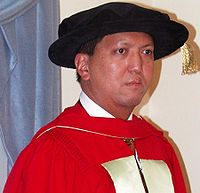
Roger Lee Mendoza
Encyclopedia

Health economics
Health economics is a branch of economics concerned with issues related to efficiency, effectiveness, value and behavior in the production and consumption of health and health care...
, and the development and implementation of privatization
Privatization
Privatization is the incidence or process of transferring ownership of a business, enterprise, agency or public service from the public sector to the private sector or to private non-profit organizations...
policies and strategies in the United States.
He obtained his Ph.D. on a Reginald Gayle fellowship from McGill University in 1993, where he trained under Nobel Laureate in Economic Science Robert Mundell
Robert Mundell
Robert Mundell, CC is a Nobel Prize-winning Canadian economist. Currently, Mundell is a professor of economics at Columbia University and the Chinese University of Hong Kong....
and Charles Taylor
Charles Taylor (philosopher)
Charles Margrave Taylor, is a Canadian philosopher from Montreal, Quebec best known for his contributions in political philosophy, the philosophy of social science, and in the history of philosophy. His contributions to these fields have earned him both the prestigious Kyoto Prize and the...
, and did his postdoctorate in Public Policy at the University of Pennsylvania. He was also a summer exchange student at the University of London in 1991. His doctoral dissertation, on economic policy and the privatization of government corporations, was completed as several industrialized and developing countries were downsizing and restructuring their public sector. Like his dissertation, many of his earlier works formulated stochastic models of divestiture and corporate restructuring that influenced or were employed in privatization initiatives in the 1990s. In 1995, then Pennsylvania Governor Tom Ridge
Tom Ridge
Thomas Joseph "Tom" Ridge is an American politician who served as a member of the United States House of Representatives , the 43rd Governor of Pennsylvania , Assistant to the President for Homeland Security , and the first United States Secretary of Homeland Security...
, later the first Secretary of Homeland Security, appointed him a member of the Base Realignment and Closure Commission (BRACC) in recognition of his scholarly contributions to public enterprise reform. As BRACC member, he helped determine appropriate privatization methods for military bases and installations which were slated by the US Secretary of Defense for closure through divestiture, merger with other military bases and facilities, base conversion and realignment.
Dr. Mendoza has contributed to scholarship in health economics through internationally, peer-reviewed publications in economics, business administration, and public health that examine the provision, production, distribution, and regulation of health care and medical services. These include studies on nephrectomy, traditional, alternative, and complementary medicine, tropical/subtropical leptospirosis, infant health promotion, oral health and water fluoridation, medical missions in developing countries, autism and its cost consequences, organ price deflation, the role of the informal health sector, merit goods in public health, underground organ trading, biological economics, population control, breastmilk and breastfeeding, and aspirin use for vascular disease prevention.
Dr. Mendoza has done actuarial work on Social Security privatization and pension administration with corporate, government and non-profit organizations, including Towers Perrin, Hay Huggins, and Bancroft NeuroHealth. He specializes in defined contribution benefits and pension plans in his professional work with pension actuarial and investment firms. He has taught at the University of the Philippines, McGill University, Drexel University, and University of Pennsylvania, and published in the areas of pension economics and public sector reform. He was elected to life membership in the international honor societies of Phi Kappa Phi (scholarship in all fields), which conferred on him a Love of Learning Award in 2009 and 2010, Pi Gamma Mu
Pi Gamma Mu
Pi Gamma Mu or ΠΓΜ is the oldest and preeminent honor society in the social sciences. It is also the only interdisciplinary social science honor society. It serves the various social science disciplines which seek to understand and explain human behavior and social relationships as well as their...
(social sciences), from which he received a 2008 Chapter Heritage Award, Phi Beta Kappa (arts and sciences), and Omicron Delta Epsilon
Omicron Delta Epsilon
Omicron Delta Epsilon is an international honor society in the field of economics. Resulting from the merger of Omicron Delta Gamma and Omicron Chi Epsilon, ODE was founded in 1963 . Its board of trustees includes well-known economists such as Robert Lucas, Kenneth Arrow, and Robert Solow...
(economic science). He is a member of the American Economics Association, the International Economic History Association, and the American Society of Pension Actuaries. He is also active in local and national historical societies.
Dr. Mendoza is listed in Who's Who in America, and received the Royer Prize in business economics, for his professional and scholarly contributions. Fluent in Spanish
Spanish language
Spanish , also known as Castilian , is a Romance language in the Ibero-Romance group that evolved from several languages and dialects in central-northern Iberia around the 9th century and gradually spread with the expansion of the Kingdom of Castile into central and southern Iberia during the...
, French
French language
French is a Romance language spoken as a first language in France, the Romandy region in Switzerland, Wallonia and Brussels in Belgium, Monaco, the regions of Quebec and Acadia in Canada, and by various communities elsewhere. Second-language speakers of French are distributed throughout many parts...
, and Tagalog
Filipino language
This move has drawn much criticism from other regional groups.In 1987, a new constitution introduced many provisions for the language.Article XIV, Section 6, omits any mention of Tagalog as the basis for Filipino, and states that:...
, he has travelled and lectured extensively within and outside of the United States.

